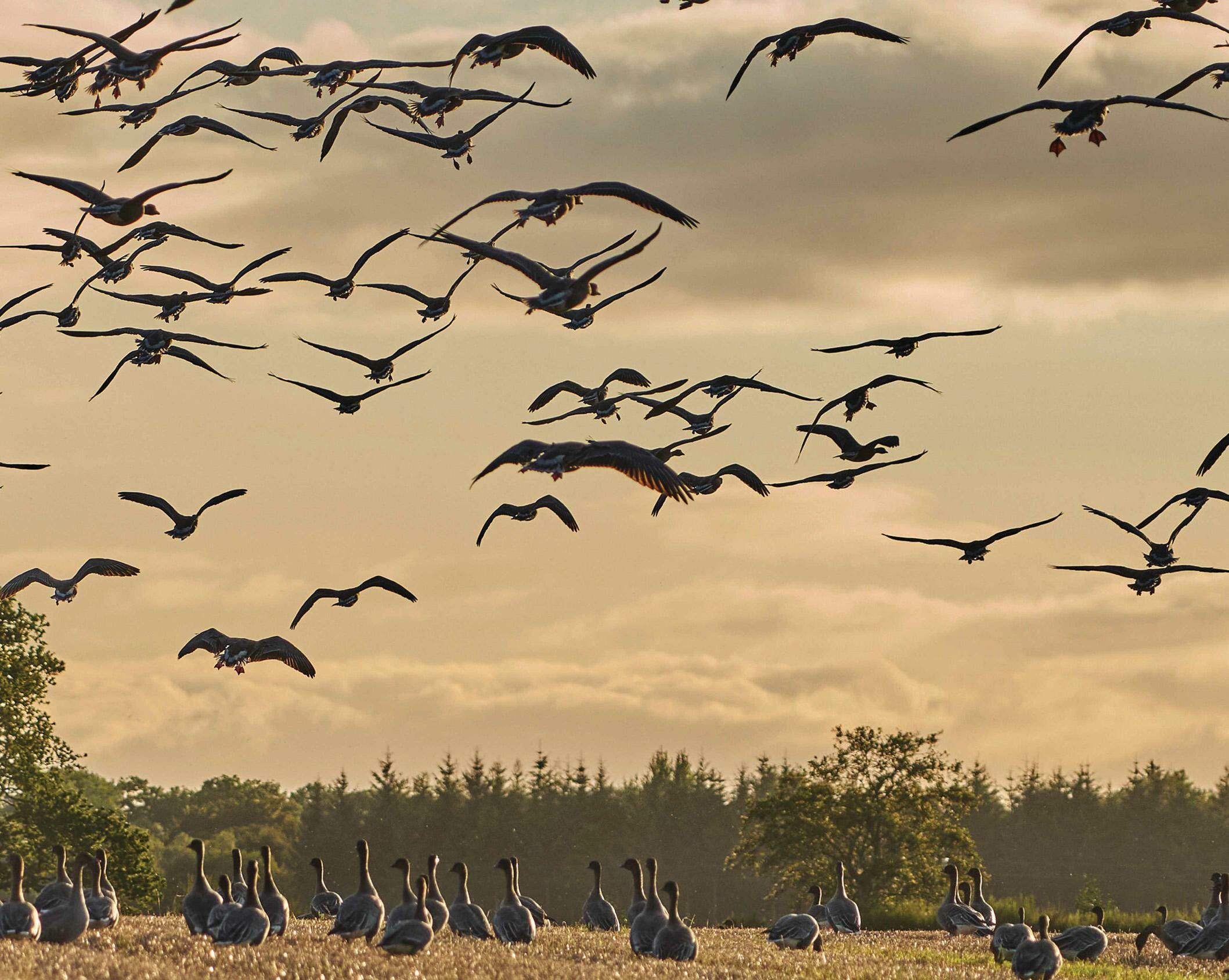
You are standing at the edge of a vast river estuary. To your right you can see the small seaside village of Findhorn; to your left you can make out the distant mountains of the Highlands. Directly behind you is a wooden birdwatching pavilion slowly falling into disrepair.
It’s a cold winter morning and a low mist is hovering over the surrounding salt marsh. The mournful cries of curlews and oystercatchers stand out from the incessant murmur of thousands of pinkfooted geese further out, which appear as a mass of swirling grey. Having spent the night roosting on the mudflats, the birds are taking a while to warm up. Their calls are at first muted and staccato, with the occasional louder ‘wink’ echoing through the melee. As the sun climbs higher, the light creeps across the nearby airfield and gradually the hubbub crescendos into a flurry of feathers and noisy calls.
A ripple moves through the flock, and the birds prepare to move. One or two skeins take to the air and circle once or twice in preparation for their forthcoming flight. When they are sufficiently warmed by the sun, they lift off, line after line, calling to each other as they go, in a breathtaking natural spectacle.
Then, there’s the unmistakeable sound of a gunshot.
Around the bay, along the high-water line, is a series of small camouflage screens. Behind each is a wildfowler with a shotgun. They have been in position since 5am, and as the geese take off, they can finally attempt to claim their prize. A series of shots rings out, but it’s difficult to see if any birds are hit because of the enormity of the flock.
This story is from the Spring 2023 edition of BBC Wildlife.
Start your 7-day Magzter GOLD free trial to access thousands of curated premium stories, and 9,000+ magazines and newspapers.
Already a subscriber ? Sign In
This story is from the Spring 2023 edition of BBC Wildlife.
Start your 7-day Magzter GOLD free trial to access thousands of curated premium stories, and 9,000+ magazines and newspapers.
Already a subscriber? Sign In

Jump Around - Bagheera Kiplingi - The acrobatic spider with a predilection for veggie food
Spiders eat flies, right? everyone knows that the 45,000 or so spiders in the world are all obligate carnivores, more or less – eating other animals, mainly invertebrates. Nature, however, loves an exception, and one particular spider missed out on that ecological memo. It goes by the wonderful scientific name of Bagheera kiplingi, and its claim to fame is that its diet is – at least mostly – vegetarian.

Female of the Species - Zebras - A strong sisterhood is key to staying safe
Zebras are masters of confusion. Their collective noun is ‘a dazzle’, which is fitting since their bodies and behaviour have been surprising scientists for centuries.

See It, Save It? - Wildlife tourism can be a powerful ally in protecting nature - but it can also harm it. We weigh up the pros and cons.
The sums of wildlife travel aren’t as simple as more tourists equals happier nature. How much did my visit really contribute to the conservation of Lady Liuwa and her habitat – and was that outweighed by carbon emissions from my flights? Did my presence disturb the animals’ natural behaviour more than it reduced the threat of poaching or benefited local communities?The question of whether wildlife travel is, on balance, good for wildlife is a complex one – and there’s no simple answer.

Can Your Really Offset Emissions? - Planning an overseas wildlife-watching trip entails facing some inconvenient truths
Imagine (or maybe you don't need to) that you hanker after the safari trip of a lifetime in sub-Saharan Africa. A 17-day tour beginning at the iconic Victoria Falls, passing through Zimbabwe, Zambia, Malawi and Tanzania, taking in some of the continent’s most wildlife-rich national parks, and ending on the lush island of Zanzibar.

Metamorphosis: a life-changing event
WITH EVOLUTIONARY BIOLOGIST JV CHAMARY

New series for BBC One: Asia
Settle in this autumn for a new natural-history extravaganza on BBC One and iPlayer: the longawaited Asia, presented by Sir David Attenborough.

Loss of Antarctic sea ice could impact seabird food supply
Albatrosses and petrels may be forced to fly further to feed

Tarsiers in trouble
Urgent action is needed to ensure survival of the Yoda-like primate

SNAP-CHAT
Chien Lee on shrew loos, rogue drones and being rained out of bed

VISIONS OF NATURE
The winners of the Wildlife Artist of the Year competition 2024, from David Shepherd Wildlife Foundation